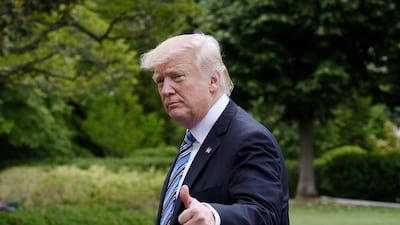American president Donald Trump will start his first foreign trip with a visit to Saudi Arabia as he seeks to reinvigorate relations with traditional allies in the region.
Writing in the London-based pan-Arab daily Asharq Al Awsat, Egyptian columnist Emile Ameen referred to a study on “offshore balancing” that was published in the August 2016 issue of the Foreign Affairs magazine.
The study recommended that Washington focus on what really matters to it, namely maintaining its historic strategic presence in western Europe and in north-east Asia, to counter the global expansions of Russia and China.
Surprisingly, the study goes on to cite the Arabian Gulf as the third area of interest to the United States.
“Indeed, while the first two regions represent the main industrial hubs, the third one is the producer of roughly 30 per cent of the world’s oil,” Ameen said.
The writer underlined the close relation between Washington’s counter-terrorism strategy – of which an 11-page synopsis was published a few days ago – and the concept of "offshore balancing", which he saw as the intellectual breeding ground for the theory.
The US counter-terrorism strategy ensures that Washington avoids military interventions as much as possible.
However, this does not mean that Washington is not prepared for new wars through regional partnerships in the Middle East and elsewhere.
“Donald Trump and his administration seek to forge new alliances, including military ones, such as an Arab Nato.
“They will automatically lend their support to these alliances in their military confrontations if need be,” Ameen said.
As such, he concluded, the next few weeks will see a new dawn in America's relations with the Middle East and the Arab world.
Writing in the London-based pan-Arab daily Al Arab, Tunisian columnist Abdul Sattar Al Khudaimi noted that since the Arab Spring broke out, the relations between the US and Gulf countries have sometimes been tepid and stagnant, and at other times robust and renewed.
“Since the election of the 45th US president and the unfolding of his new foreign policy, the whole world has been keen about the reactivation of its partnership with Arab and Gulf countries that are influential on the economic, security and military scene,” Al Khudaimi noted.
According to the writer, such keenness is born of the desire to undermine Iran’s power and halt its military activity in Lebanon, Syria and especially Yemen.
On the other hand, the reactivation of such a partnership would curb Russia, which has been occupying the vacuum left by the US.
“Saudi Arabia has endeavoured to get these relations back on track with Deputy Crown Prince Mohammed bin Salman paying a historic visit to Mr Trump.
“The United States is also seeking to bridge the gap in its relations with the Gulf and Arab countries in a bid to restore its leadership position at the regional and global levels after Russian president Vladimir Putin had monopolised the regional scene,” he wrote.
Another reason behind the efforts to reinvigorate the alliance between the US and the Gulf and Arab countries is to directly influence the outcome of the conflicts in Syria, Yemen and Iraq.
“They want to retain their positions or reposition themselves in the light of Iran’s aspirations for a Shiite crescent, and of Putin’s dream of an empire.”
For all the above reasons, the writer concluded that Mr Trump has to put some order to his country’s strategic partnership with Saudi Arabia, the UAE and other Gulf countries, not to mention Egypt, Morocco and Tunisia.
* Jennifer Attieh
translation@thenational.ae

